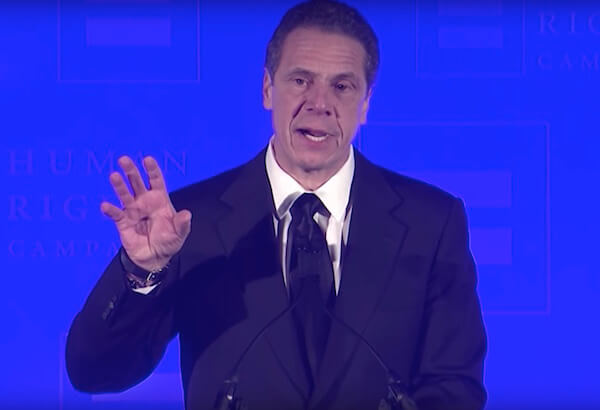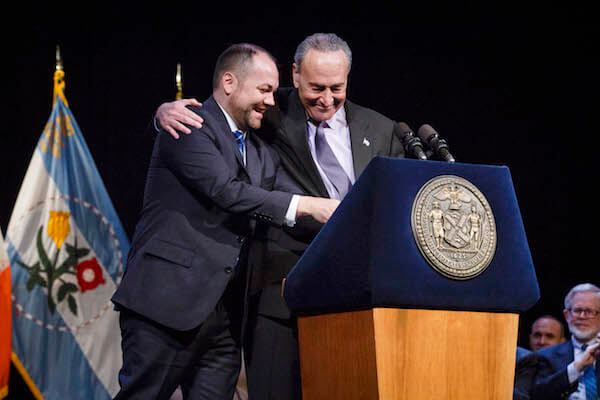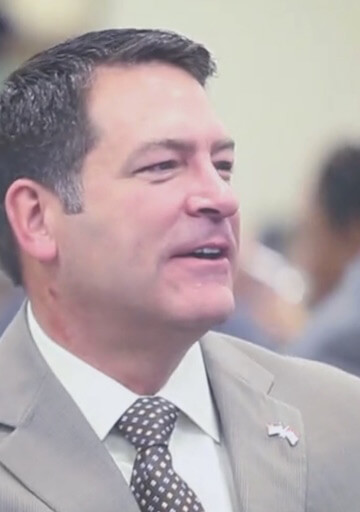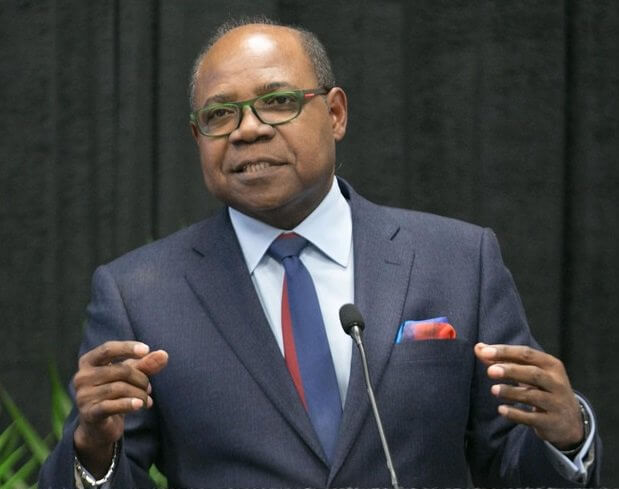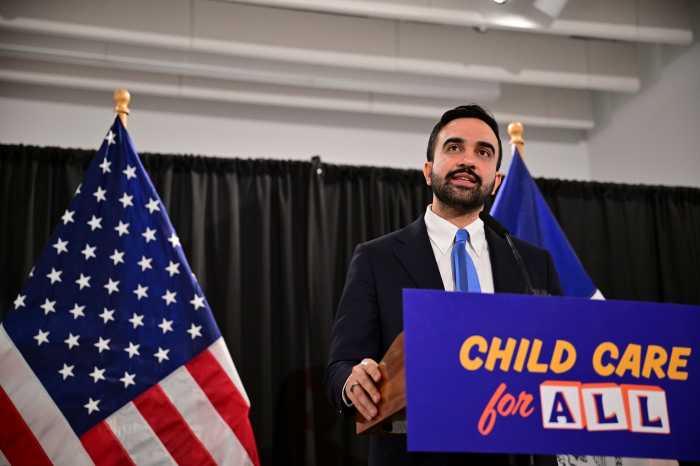Senator Kirsten Gillibrand, in passionate terms, identified her mission with that of the Democratic Party’s left-leaning grassroots. | COURTESY: HRC
BY PAUL SCHINDLER | At its annual New York City Gala this month, the Washington-based Human Rights Campaign presented a program that focused just enough attention on the dangers created since Donald Trump became president to press the urgent need for the community to engage in productive resistance to the now one-year old administration.
“We are living in a very different world than we were just a couple of years ago,” said Chad Griffin, the group’s president, in brief remarks amidst speeches from three high-profile New York politicians. “Living through this moment can be truly exhausting. It’s tempting to want to simply give up… But you know what? That’s exactly what Donald Trump, Mike Pence, and the entire cabinet of deplorables are hoping that we do.”
But even as the February 3 gathering at the New York Marriott Marquis in Times Square offered compelling arguments for staying engaged, it was also a showcase for two potential 2020 Trump challengers. Appearances by Governor Andrew Cuomo and Senator Kirsten Gillibrand offered distinctive profiles in political rhetoric and the different paths each might take in rallying support should they choose to make the race.
Andrew Cuomo, Kirsten Gillibrand offer contrasting visions for rousing the opposition
Cuomo, the evening’s first speaker, blended his trademark boasting about New York’s storied progressive past with a showy display of the executive power he has wielded for nearly eight years and a subtle reminder that as Washington goes, he’s been an outsider — at least since he served as Bill Clinton’s Housing and Urban Development secretary.
“These are dark times in this country,” the governor said in opening his remarks. “What’s even more shocking is how far we have gone from a period of outstanding accomplishment in the pursuit of justice to a place of regression, anger, and intolerance… Yesterday, we had President Obama, we passed marriage equality, we had record LGBT progress, we were defeating intolerance.”
In contrast, now, Cuomo continued, “We have this president and this Congress who have brought us to the exact opposite position. We know what they did, and we know how they won. They won by fanning the flames of anger, they amplified people’s anxieties, they appealed to people’s worst instincts to fear people who are different.”
Governor Andrew Cuomo emphasized the example New York can provide to the nation. | COURTESY: HRC
Cuomo placed primary responsibility for resisting the changes Trump’s ascendancy threaten on members of his own party — at least those serving in the nation’s capital.
“The Democrats in Washington must join forces and they must stop the administration’s attempts at reversals by any means possible,” he argued. “And whatever the Democrats have to do — stand up, speak up, lay down, shut down, I don’t care. Whatever is necessary to do we must do because you cannot compromise with hate and prejudice.”
Then, pointing to New York’s pivotal role in movements including LGBTQ rights and women’s suffrage, Cuomo pledged relief he would deliver as governor here — legislation to bar any “gay panic” defense in the courtroom, not “one penny of state money” for “any school that refuses to protect transgender students,” “an executive order prohibiting New York State government from doing any business with any entity that discriminates against any New Yorker, period.”
In capping his argument that New York can lead the way for the nation, Cuomo noted expected declines in federal funding on HIV and AIDS and pledged, “We’re going to redouble our efforts here in New York and assure people that we’re going to reach the goal of ending AIDS as an epidemic by 2020, and we’re going to get it done and we’re going to show it can be done, and then we’re going to say to every other state across this nation, ‘Join us in ending AIDS.’”
For those hoping to see a Cuomo presidential campaign in 2020, effective executive action is the winning argument against an administration beset by chaos and divisiveness.
Gillibrand’s remarks, which followed closely on the governor’s, opened with less fire, though she immediately tied herself to the most significant advance in LGBTQ rights to have come out of Congress, the repeal of Don’t Ask, Don’t Tell, “a monumental task,” she said, that came during her first two “green” years in the Senate, when a majority of Americans still opposed marriage equality. Gillibrand, in fact, was a key player in getting Democrat Carl Levin, who then led the Senate Armed Services Committee, to hold hearings that proved a pivotal moment in the repeal drive.
But having pointed up her own advocacy, she then gave credit to the activists on the ground. The experience, she said, “taught me a fundamental lesson that I will never forget: Washington only acts when courageous people… stand up and demand it. Don’t Ask, Don’t Tell didn’t end because of lawmakers like me. It ended because of the protests, the calls, the activism of people like you.”
Through much of the rest of her remarks, Gillibrand identified herself with the passion of those activists — at a time when there is more street activism, as her New York colleague Chuck Schumer would later remind the crowd, than at any time since the Vietnam War. Talking about the pride she had in a local youth’s gender transition in a school her child attended, she said, “So when President Trump looks at our transgender troops as valueless and when his party tries to demonize this boy and every other like him, this arrogance and bigotry provokes a fury in me that will not subside.”
Gillibrand then talked about the grassroots opposition to neo-Nazis marching in Charlottesville, to the immigration crackdown (noting that an estimated 75,000 Dreamers identify as LGBTQ), and to the failed effort to replace the Army’s out gay Obama era secretary, Eric Fanning, with the virulently anti-gay Mark Green, a Tennessee state senator.
“I promise you not until we pass a bipartisan bill that I introduced with Senator John McCain we will stop fighting to protect these transgender troops,” Gillibrand pledged. “In 2011, John McCain was one of our most ardent opponents of repealing Don’t Ask, Don’t Tell. In 2017, he added his name to my bill to protect those same troops.”
Turning to the poisonous political climate and spiraling hate violence unleashed by Trump, Gillibrand embraced the politics of intersectionality championed by many grassroots progressives, saying, “If you live at the intersections of any of these communities, if you are a black lesbian or a trans woman, the rates of violence are even higher. This hatred has no place anywhere in our great nation.”
Gillibrand’s remarks reinforced the widespread perception that she has decided the Democratic Party’s future lies with its left-leaning grassroots activists, many of whom were aligned with Senator Bernie Sanders in the 2016 primaries.
During his remarks, HRC’s Griffin also spoke in intersectional terms, noting an alliance with the NAACP in Alabama’s special US Senate election, pointing to the “epidemic of violence” against transgender women of color, emphasizing the group’s common cause with immigrants’ rights, voting rights, and women’s rights, and name-checking Black Lives Matter, the #MeToo movement, and the new Time’s Up initiative to combat sexual assault in the workplace.
The results from November’s legislative elections in Virginia — where Danica Roem, a transgender Democrat, beat the House of Delegates’ most anti-trans incumbent — and the Alabama Senate race, Griffin said, proved that “the days of attacking our community to scare up votes are over and a reckoning is coming this November.”
Schumer, for his part, kept his remarks short, theatrically ripping up his speech to talk about how his political hunger was first stirred at Harvard in 1967 when he was recruited into Senator Eugene McCarthy’s insurgent challenge to President Lyndon Johnson, who bowed out after a win that was humiliatingly narrow in the New Hampshire primary. Seeing the same sort of activism he experienced then, Schumer sounded upbeat about big Democratic victories in November — enough to flip both the House and the Senate.
If his party gains Senate control, Schumer said, “I will have the sole power to determine what goes on the floor of the Senate, and that will means we will not get another backward, right-wing justice of the Supreme Court, period. And we will stop the anti-LGBT cascade of things that come into the Senate.”

